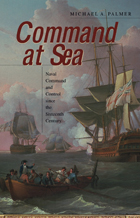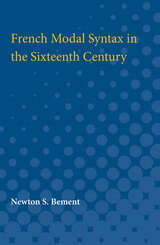
Contributors. Irena Backus, Guy Bedouelle, Kalman P. Bland, Kenneth G. Hagen, Scott H. Hagen, Scott H. Hendrix, R. Gerald Hobbs, Jean-Claude Margolin, H. C. Erik Midelfort, Richard A. Muller, John B. Payne, David C. Steinmetz

Commanders at sea struggle not only with the unpredictability of natural elements, but also with a shroud of uncertainty often referred to as the "fog of war." Over the centuries most admirals yielded to the natural temptation to find in new technologies a means to assert centralized control over their forces. But other commanders have recognized the fog for what it is: a constant level of uncertainty resistant to mere technological solution.
In this grand history of naval warfare, Michael Palmer observes five centuries of dramatic encounters under sail and steam. From reliance on signal flags in the seventeenth century to satellite communications in the twenty-first, admirals looked to the next advance in technology as the one that would allow them to control their forces. But while abilities to communicate improved, Palmer shows how other technologies simultaneously shrank admirals' windows of decision. The result was simple, if not obvious: naval commanders have never had sufficient means or time to direct subordinates in battle.
Successful commanders as distant as Horatio Nelson (1758-1805) and Arleigh Burke (1901-1996) accepted this reality. They sought solutions to the dilemmas of command in the personal indoctrination of subordinates through discussion, comradeship, and displays of trust and confidence. Such leaders created a commonality of vision and fostered a high degree of individual initiative. Their decentralized approach to command resulted in a resiliency that so often provided the key to success in battle.
Palmer's exciting and enlightening history reveals the myriad efforts of naval commanders to navigate the fog of war.




Lucien Febvre’s magisterial study of sixteenth century religious and intellectual history, published in 1942, is at long last available in English, in a translation that does it full justice. The book is a modern classic. Febvre, founder with Marc Bloch of the journal Annales, was one of France’s leading historians, a scholar whose field of expertise was the sixteenth century. This book, written late in his career, is regarded as his masterpiece. Despite the subtitle, it is not primarily a study of Rabelais; it is a study of the mental life, the mentalité, of a whole age.
Febvre worked on the book for ten years. His purpose at first was polemical: he set out to demolish the notion that Rabelais was a covert atheist, a freethinker ahead of his time. To expose the anachronism of that view, he proceeded to a close examination of the ideas, information, beliefs, and values of Rabelais and his contemporaries. He combed archives and local records, compendia of popular lore, the work of writers from Luther and Erasmus to Ronsard, the verses of obscure neo-Latin poets. Everything was grist for his mill: books about comets, medical texts, philological treatises, even music and architecture. The result is a work of extraordinary richness of texture, enlivened by a wealth of concrete details—a compelling intellectual portrait of the period by a historian of rare insight, great intelligence, and vast learning.
Febvre wrote with Gallic flair. His style is informal, often witty, at times combative, and colorful almost to a fault. His idiosyncrasies of syntax and vocabulary have defeated many who have tried to read, let alone translate, the French text. Beatrice Gottlieb has succeeded in rendering his prose accurately and readably, conveying a sense of Febvre’s strong, often argumentative personality as well as his brilliantly intuitive feeling for Renaissance France.
READERS
Browse our collection.
PUBLISHERS
See BiblioVault's publisher services.
STUDENT SERVICES
Files for college accessibility offices.
UChicago Accessibility Resources
home | accessibility | search | about | contact us
BiblioVault ® 2001 - 2024
The University of Chicago Press









